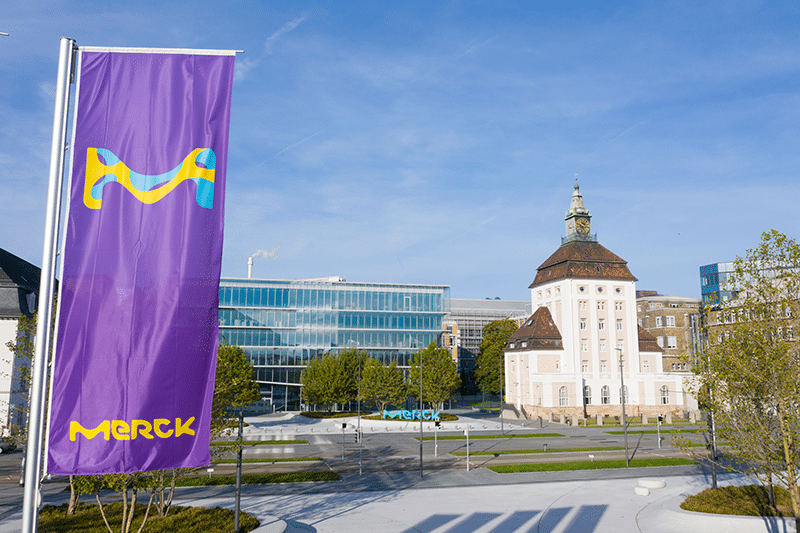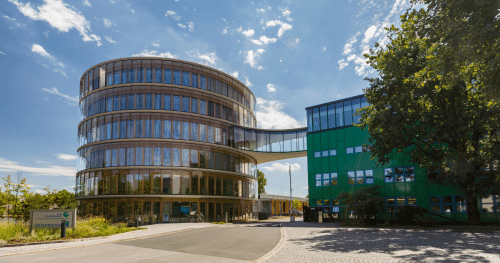Sector
Healthcare, life sciences, and electronics
Scope
15 buildings (in a first phase)
The Objective: Improve Space Efficiency and Sustainability
The Merck Group plans to drastically reduce CO2 emissions from its real estate. The objective is to become a leader in sustainable energy while also saving resources and optimizing workspaces for hybrid work. Realizing that space efficiency and energy efficiency in commercial buildings go hand in hand, gaining insight into space occupancy and utilization was an obvious first step, especially with remote and hybrid work on the rise. Under-utilized spaces, floors, or even entire buildings, especially those that have been identified as energy inefficient, can then be temporarily shut down, taken out of service, or repurposed.
How Merck Optimized Space Efficiency and Energy Efficiency in its Commercial Buildings
Merck leveraged Spacewell Workplace‘s ability to collect real occupancy rates and analyze utilization. As a result, the Merck Group could accurately estimate how much space it needed for its employees on a given workday. This needed workspace was then concentrated on a smaller number of buildings. This enables Merck to ‘shut down’ energy-inefficient buildings and unused areas and save energy, especially during winter.
Workspaces in the remaining areas can easily be booked by employees using the Workplace Experience room and desk reservation tool, which shows free spaces on digital floor plans. This empowers employees to work more flexibly and move to buildings or floors other than the ones they are already used to.
Real-World Results
During the Covid pandemic and the subsequent period of hybrid work, nine buildings were wholly or partially hibernated. This was done by turning down heating systems to a ‘healthy for buildings’ minimum and shutting down electrical circuits that are not safety-relevant. At the same time, the required number of workstations was identified and made available in the most energy-efficient buildings so that all employees can work in optimal conditions.
By reducing energy consumption by 50 to 60 percent, the Merck Group is saving about 150,000 tons of CO2 in its office buildings.
The next step will be to implement demand-oriented building technology control in individual buildings based on occupancy and reservation data. The aim is not only to heat or cool individual floors or building sections as needed in the future but also to better target other activities such as cleaning. This will help to make operations even more sustainable and further reduce energy and operational FM costs.
About the Merck Group
Merck is the world’s oldest operating chemical and pharmaceutical company, as well as one of the largest pharmaceutical companies in the world. The belief in forward momentum through technology is a cornerstone in the ethos of Merck, ever since its inception in 1668. This vision makes it evident why Merck Group has been a trailblazer, always breaking new ground. This also holds true in how Merck manages its corporate real estate, as they incorporate new digital technologies to optimize the workplace and make it more sustainable.

Whether it’s healthcare, life sciences or electronics, Merck’s teams dedicate their time and resources to creating solutions that work for their customers. Thanks to their global presence with 66 sites and 58,000 employees in total, they are able to provide localized service that caters to the needs of different markets.
From their corporate headquarters in Darmstadt, Germany, to their numerous sites throughout the world, Merck is dedicated to providing life-enhancing products and services that aid people’s well-being. Their commitment is evident every day as they strive to improve lives around the globe.

Based on close cooperation with CREM SOLUTIONS, the system consisting of Workplace and the integrated IoT solutions was designed in such a way that the Merck Group’s desired need for a smart building solution is completely mapped – the monitoring of spaces as well as an uncomplicated booking of desks and rooms – both for employees and management.
Daniel Mihaljevic
IT Manager and Project Manager at Merck Real Estate Office & Lab










